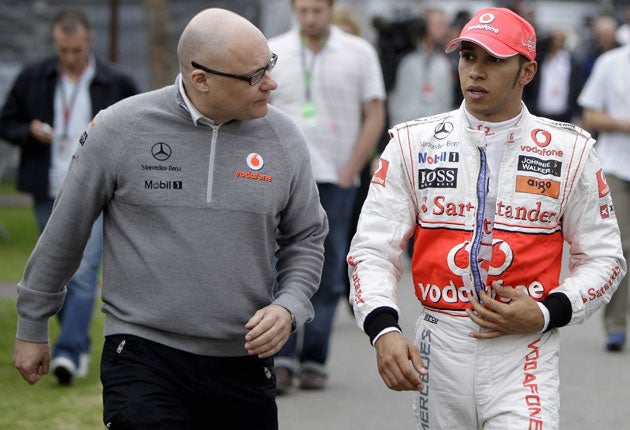James Lawton: High time for Hamilton to slow down and grow up
To complain while the race was running was a shocking lapse of professionalism

Your support helps us to tell the story
From reproductive rights to climate change to Big Tech, The Independent is on the ground when the story is developing. Whether it's investigating the financials of Elon Musk's pro-Trump PAC or producing our latest documentary, 'The A Word', which shines a light on the American women fighting for reproductive rights, we know how important it is to parse out the facts from the messaging.
At such a critical moment in US history, we need reporters on the ground. Your donation allows us to keep sending journalists to speak to both sides of the story.
The Independent is trusted by Americans across the entire political spectrum. And unlike many other quality news outlets, we choose not to lock Americans out of our reporting and analysis with paywalls. We believe quality journalism should be available to everyone, paid for by those who can afford it.
Your support makes all the difference.Lewis Hamilton may be the fastest thing on four wheels but in the race for maturity it could be that he is in need of a new strategy.
It is one that might benefit from some of those things that are probably more easily acquired in the slow lane of life rather than the fast one of Formula One.
Things like a hint of understanding that in a sport like his – especially the form of it which is now so dominated by the engineers, designers and aerodynamists – even the most enviable talent for going quickly has to be underpinned by other qualities.
Reliability is one of them, and it is ironic that so much of it was displayed by Hamilton's McLaren team-mate, Jenson Button, on a weekend when his own display in this department left so much to be desired.
Ferrari and Red Bull, McClaren's fiercest rivals, announced an impressive ascendancy in the first race in Bahrain two weeks ago. For the watching public the race might have had the impact of a couple of Mogadon, but for the team who launched Hamilton's career, and invested so much in his potential, it was more than anything a call to arms in a ruthless business.
Their response in Melbourne was mostly brilliant, delivering the car which enabled Button to remind the world of his particular talent of smooth stewardship of a competitive vehicle, and admitting readily enough that in the matter of Hamilton's race they were guilty of a call which may have cost their driver three places.
Hamilton could perhaps not be expected to rejoice in such circumstances. But it was perhaps reasonable to believe that he would weigh the pluses, including a world title at the age of 23 which his former team-mate Fernando Alonso will always swear was personally hand-wrapped and presented to him by the former team boss, Ron Dennis, and the minuses, and reflect on the value of a relationship which propelled him to the top of his sport at an earlier age than any of his predecessors and demigods like Juan Fangio, Jim Clark and Ayrton Senna.
There was not much evidence of any of that when Hamilton angrily voiced his protest that he deserved better than the two-stop strategy that left him in sixth place. His first complaint came when the race was still running, a lapse of professionalism that shocked some professional observers. This included some names who have been mentioned as potential mentors, or minders, now that Hamilton's close working relationship with his father Anthony appears to have fallen away.
It was doubly unfortunate that Hamilton's misadventure on the track came at the end of a weekend which started with the Melbourne police impounding his road vehicle after a driving performance of some irresponsibility, the second time this has happened in his short career. Eyebrows were apparently raised in the McLaren compound when he arrived late in Australia after a stop-over in Los Angeles.
Hamilton may have been soothed, if not helped, by the flood of support from those of his fans who rushed to make their own complaints about the team plan that misfired. As quickly as they admitted their culpability, the team was no less prompt in acknowledging that Button's race-winning early change to slicks came at his own prompting – and was a direct result of his intuitive feel for his car.
In such circumstances Hamilton, surely, would have been wiser to grin through his grievances. He has constantly said how much he has benefited from the support of his team – and most volubly in the first two years of extraordinary success, when he was second and first in the drivers' championships in a car that was plainly the fastest and most efficient on the grid.
Now, when the track is tilted less obviously in his favour, he continues to display a remarkable talent. Also visible, though, is the impression of a young man who may have moved a little too quickly for his own good. It may go against his strongest instinct, but there are times when it is more important to step back than race forward. If there has ever been such a time in Lewis Hamilton's life, it is surely now.
Join our commenting forum
Join thought-provoking conversations, follow other Independent readers and see their replies
Comments